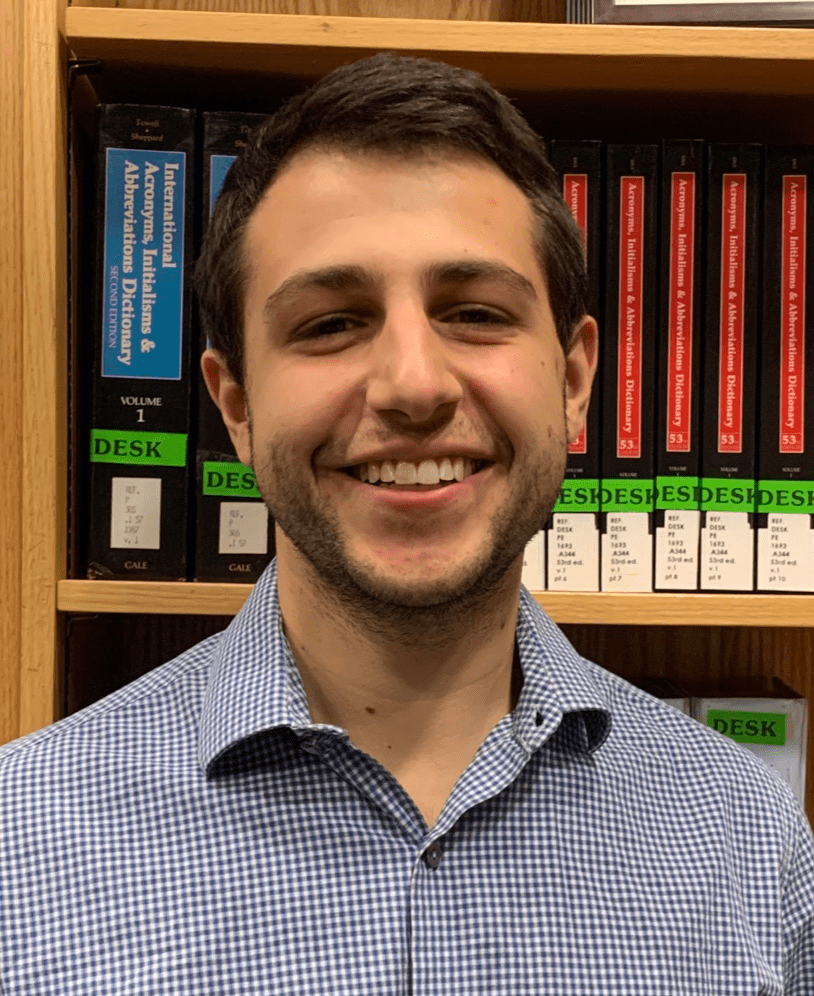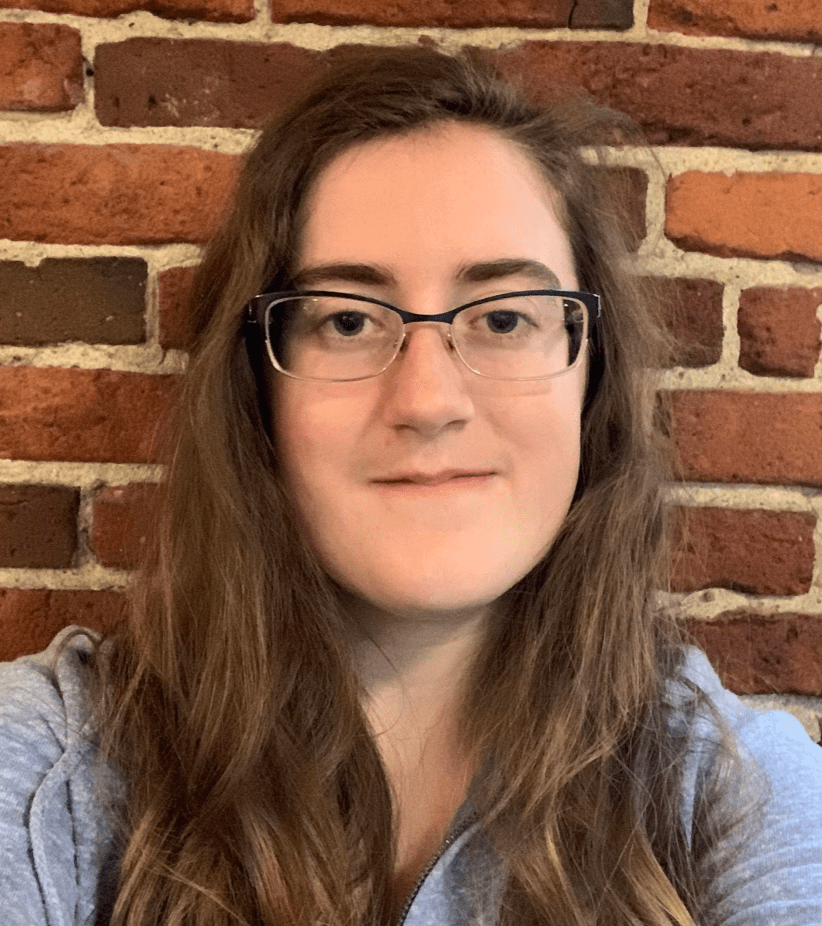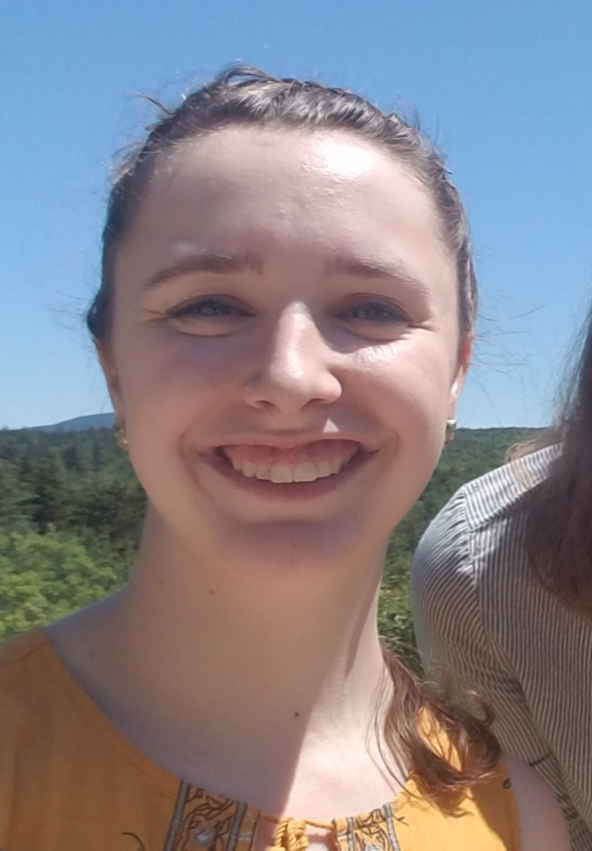Welcome to your brand new blog at Boston College CampusPress Network Sites.
To get started, simply log in, edit or delete this post and check out all the other options available to you.
Welcome to your brand new blog at Boston College CampusPress Network Sites.
To get started, simply log in, edit or delete this post and check out all the other options available to you.
Meet O’Neill Library’s three Reference Assistants, Jacob, Rina, and Bridgett.
Have you stopped by to say hello at the O’Neill reference desk on a weeknight this semester? If you have, you likely met the evening reference assistants! The three of us work from 4pm to 9pm, Monday through Thursday, at the reference desk. We are all students at Simmons University, pursuing our master’s degrees in Library and Information Science.

Jacob: I have just recently begun my studies in library science and am in my first semester of studies at Simmons University. Earlier this semester at Simmons, I told an advisor about my position at O’Neill Library. My advisor noted that evening shifts were a rite of passage in the library community, and he recommended that I make an effort to record and reflect on my experiences. So far, I have had many opportunities to help both undergraduate and graduate-level students to make better use of the many resources available at O’Neill. Having studied history at the undergraduate level, I have most enjoyed helping students sharpen their skills in the craft of historical research. My colleagues and I have worked to help students focus their research questions and identify suitable primary sources for their papers. Working on the evening reference team has also offered me the chance to learn from the students of Boston College. Every time I staff the reference desk I get to help students find resources on a wide range of subjects that I’ve never had the chance to personally study – medicine, sociology, business. My experiences in the library have given me a glimpse of much larger aspects of Boston College. I’ve recognized that this university provides an excellent environment for enabling students, staff, and faculty to learn from and serve one another, and I am glad to be a part of this community.

Rina here! I will be getting my degree in May (almost there seniors!). I am originally from Virginia and only moved to the Boston area recently. Initially I did not like living here, but working at Boston College has been so much fun that I’ve learned to love my new home. I had no idea what I wanted to do after I got my degree or where I wanted to work, and I think we’ve all been there at one point or another. But now I’ve realized that I want to continue working in higher education libraries. The work I do at Boston College, even just as a student, has been so enjoyable and I’ve learned so much both from my coworkers and from the questions I help answer at the desk. As someone who specializes in historical research, I had to learn the hard way that scientific research, business research, and basically all other types of research are completely different. As such, it is important to approach each search differently and to know which databases are useful for each type of research. While I’ve learned all of this and other theories in class, it really sinks in when someone comes to the desk and asks me how to find something I’d never even thought to find before. Life at the desk is about learning something new, and in the evenings it’s about helping students who started late get help even though the rest of the staff is already gone for the day. In the end, I’m overjoyed to be able to help confused or struggling students realize that things are not as hard as they seem.

Bridgett: I think my favorite interactions with students are the first-year writing papers. Students will come up with an amazing, sometimes even too-timely topic that they are really excited about (everything from racism to comic books to waterfront erosion in Massachusetts) and then quietly, and anxiously say–after all they’ve never done this before and what if they can’t and that means they’re Not Cut Out For College? And now they’re Bothering A Librarian, which every pop culture reference to libraries says is not good, and they’ve also bared their soul through a research topic to a stranger–“so I need to find some” (there’s usually a beat here to remember the word) “peer-reviewed sources.” Of course I’m kinda panicking too–because where do I even start with that–after all, I was an English major so my go-to, MLA Bibliography, is a very specific database that does not cover socio-political issues, or really much of anything that isn’t book related. But we (sometimes quickly and sometimes eventually) find something (thank you Research Guides) or at least a place to start, which is relieving for both of us. But really, our interactions are so unique and varied–everything from “where’s the closest microwave?” to “this whole row of computers just lost power!” to “Hey it’s been awhile since I was an undergrad, can you refresh my memory on how this research stuff works?” to “I’ve never used a library before–help!” that it’s really hard to describe them all together or to have expectations on what your workday will look like!
As you may have noticed we all love learning something new, so come by for a chat on your way home one day. Even if you don’t have a question for us, feel free to stop by the desk and just say hi!
The old computer server room on O’Neill Library 5th floor has been remodeled as a new study space!
If you have recently walked around the 5th floor of O’Neill Library you may have noticed a drastic change: where closed doors used to hide a large disused data storage room, there now exists a remodeled space intended to accommodate students.

The space, originally the server room for university computing, featured a Halon system designed to suppress the spread of fire without compromising computer data. In 2006 the servers were moved to St. Clement’s. The space was empty for a long time because the expense of uninstalling the suppression system prevented it from being repurposed without a definite goal in mind.
Not that the space went unnoticed. Space Planning, a department of the university in charge of managing space-related projects, was aware of the room’s potential in light of its focus on student formation on campus. Space Planning began looking at several areas around campus in an effort to meet the need for more student spaces, with thoughts around available spaces on Newton campus as well as on Hammond Pond Parkway. Out of a range of different possible futures for the abandoned server room (such as ITS’s aims to consolidate its services there), the library’s plan to transform it into student space eventually received funding.
From this summer into the beginning of the current semester, you may have noticed noise and work crews in O’Neill as Capital Projects worked with outside vendors to remove the system and make the space habitable.

As of mid-October, the room is ready for use. Temporary rental furniture provides a basic level of accommodation appropriate to the first phase of the project as library staff investigates how students use the space. Once usage and purposes are clear, phase two will bring furnishings and a layout that accommodate observed needs.
Two signs advertising the newly designed space also invite suggestions from students, in keeping with O’Neill’s dedication to creating flexible user space adapted to library users’ needs. (You can submit comments via this form.) Feedback about noise, for instance, has already led to the installation of white-noise generators. Library staff needs to understand the priorities of library users.
With growing pedagogical use of group-oriented projects, areas adapted to collaborative work have been subject to high demand. At the same time, students still need spaces for quiet solo work, and as the popularity of programs like Brain Break and the therapy dogs demonstrate, students also need spaces where they can unwind and recharge.
Looking ahead, there are many possibilities for additional work to be done to the room. For the moment the space is a white-walled room with no outside view, so installing windows seems like a logical next step. If funded, such an undertaking would likely not see fruition until 2021.
Other ideas for the library include expanding and updating instructional spaces, as well as relocating more of the collection from the 5th floor to warehouse storage to make space available for studying.
Like other academic libraries, O’Neill has been a dynamic building, responding to changes in needs. The library’s space has undergone many changes. In years past, the government document collection was moved to warehouse storage to make way for study and gallery space on the first floor, the reserves collection was relocated to behind the circulation desk to make way for the Reading Room, the entry was added on the 1st floor, another added on the second, and the old media center was renovated to become the Digital Studio. As University Librarian Tom Wall makes clear through the initiatives and projects he endorses, O’Neill has been and will continue to be a place that adapts to the BC Community’s evolving needs. The remodeling of what was once a server room represents one moment in the larger trajectory of change that will continue to move us along.
For the time being, this means we have added additional study space for students. It also means we can collectively rejoice–gone are the weeks of construction noise, limited elevator access, and blue-taped corridors!
A slightly different version of this article is also being published in Keywords, the staff newsletter of BC Libraries.
BC Libraries staff worked with Connell School of Nursing faculty to help reduce costs for students in the Montserrat program.

Academic libraries are involved in providing support and information access for all students, faculty and staff. Over the years the Boston College Libraries have worked with the staff at the Montserrat Office to actively support our high financial need students. Some of the services offered include a lending program of items such as textbooks, ipads, laptops, calculators, headphones, software, and so much more. Additionally, utilizing many of the library-subscribed resources and open access materials, librarians often partner with faculty to assist in curating course materials at low or no cost to students.
This fall, because many students enrolled in the Connell School of Nursing are Montserrat students, the Libraries intentionally worked with the School of Nursing faculty to assist students in making sure they had their course materials on the first day of classes. This work included thinking strategically about how to use a variety of resources such as ebooks, book chapters, and journal articles in order to keep the student cost of course materials down.
Connell School Nursing Student
We are so thrilled to have that support from the CSON and Library department. Through their efforts, we have been able to stay on top of our readings and assignments in a timely manner. They truly made a difference for us, and we are extremely grateful!
For more information about these services and programs, contact Margaret Cohen, Head Librarian, Educational Initiatives and Research Services.
Join Boston College and Boston University Libraries at CrowdCafe. Participate in crowd-sourced projects on the third Friday of every month,1 pm – 3pm. Join online via Zoom or in-person in the Digital Studio, room 205, O’Neill Library.
Gabe Feldstein, Digital Publishing and Outreach Specialist, interviewed Sarah Melton, the Head of Digital Scholarship and co-coordinator of CrowdCafe.

When did CrowdCafe start? Was there a particular campaign that inspired this model for getting things done as a large group?
We were particularly inspired by humanitarian relief projects that mobilize volunteers in the wake of disasters. The Humanitarian OpenStreetMap Team, for example, crowdsources data that is used to improve maps of areas that have been affected by disasters, giving responders a better sense of on-the-ground, real-time conditions. Map-a-thons after Hurricane Maria hit Puerto Rico helped provide the Red Cross with navigation information, even when existing maps were missing roads, buildings, and other geographic data.
CrowdCafe began in 2018 as a collaborative initiative between digital scholarship staff at Boston College and Boston University Libraries. Led by Sarah Melton, BC’s Head of Digital Scholarship, and Vika Zafrin, BU’s Digital Scholarship Librarian, the monthly event aims to provide a loose infrastructure for people wishing to contribute to crowdsourced projects.
Additionally, with more and more cultural heritage materials available online, we wanted to encourage local participation in crowdsourcing projects on a regular basis.
Continue reading “Contribute to Crowd-Sourcing Projects at CrowdCafe”BC Libraries is celebrating Open Access Week for the whole month of October with displays in the O’Neill Library lobby that emphasize equity of access.
Open Access is the free, immediate, online availability of research articles coupled with the rights to use these articles fully in the digital environment. Open Access ensures that anyone can access and use these results—to turn ideas into industries and breakthroughs into better lives.
International Open Access Week is from October 21-27 this year. Every year, the coordinating organization, SPARC, chooses a different theme on which to focus. The theme for 2019 is, “Open for Whom? Equity in Open Knowledge.”

Tom Wall, University Librarian, reflects on the hope and renewal that the start of the fall semester brings, with special emphasis on Ignatian principles relevant to scholarship and BC Libraries.
 The fall term always seems to bring a feeling of hope and renewal to college campuses. For many people the season also begins a period of anticipation, with the holidays, the beauty of autumn, and meetings with family and friends. In some respects, it’s the time of year that most embodies the adage that “happiness is having something to look forward to.”
The fall term always seems to bring a feeling of hope and renewal to college campuses. For many people the season also begins a period of anticipation, with the holidays, the beauty of autumn, and meetings with family and friends. In some respects, it’s the time of year that most embodies the adage that “happiness is having something to look forward to.”
The influx of young minds to the academy brings new ideas and expectations as well, and if I could borrow an Ignatian metaphor, these emerging ideas and conceptions symbolize the heart; and conversely the University with its history and stability are more akin to the mind. Together, the convergence of the students (heart) and University (mind) form a compelling dynamic that is at once challenging and punctuated by optimism. When it works, we have the meta-instance of Ignatian consolation; when it struggles, we have desolation.
Ignatius offers a number of concepts I’ve been reflecting on lately in the context of anticipating change. In addition to consolation: accompaniment, mobility, and indifference.
Thoughts on creating a culture of innovation at the Boston College Libraries.
This past spring Facebook founder Mark Zuckerberg addressed the graduates from Harvard College and said that “the greatest successes come from having the freedom to fail”. Likewise, in a recent letter to shareholders Amazon’s Jeff Bezos made it a point to equate innovation with failure, calling them “inseparable twins”. Arguably leading two of the most innovative companies in the world, both CEOs have essentially the same message; that without a culture that accepts the inevitability of failure, and learns from it, innovation will remain elusive and/or non-existent. Clearly with risk comes a degree of failure, but by playing it safe you get exactly what you would expect: mediocrity.
That Association of Research Libraries’ Innovation Lab, of which I am the inaugural Chair, acknowledges the fact that many research libraries lack the wherewithal required to innovate, despite leadership that yearns to embrace change. Several reasons may account for the entrenchment of library practice, most notably staff overly comfortable with playing it safe and preferring order over uncertainty. Unfortunately, entrepreneurial culture by its nature changes rapidly, tolerates risk and failure, and tends to have periods of disruption. It’s not the image most have of libraries, but libraries have been passive change agents for a long time. Even when we consider some of the best companies in the world, many of their services and innovations mirror long-time library practices. Facebook with personalization; Amazon with delivery; Google with search and discovery; Netflix with streaming content; and Apple with mobility. None of this is new to libraries, we just did not go out and form multi-national, multi-billion dollar for-profit companies for these services. The irony, however, lies in the fact that we are now playing catch-up with the same companies that learned from our successes and built on our work.
Give up the white paper, three-year plan motif
Instead of the standard approach based on reports and long-term plans, libraries should facilitate open-ended brainstorming discussions, where the absurd to the sublime are encouraged. Be intentional about bringing people from differing backgrounds and expertise into these discussions. Establish an expectation of participation. A diversity of ideas challenges the canon and innovation cannot happen within the canon.
At no point should budget considerations or other resource restrictions be allowed in brainstorming and idea-generating conversations. Nothing kills the innovative spirit like the comment “how are we going to pay for that?” when an idea is being conceived. This approach has its detractors however. Some feel that without parameters innovative ideas can lose context. For me, however, it’s not that resource parameters are not important, but that the sequencing can occur much later in the process, after compelling ideas emerge.
If documentation is required, try a one-pager outlining the idea and possible benefits rather than spending months writing a detailed planning documents that quickly become obsolete. Make it something like an elevator talk: intelligible, concise and compelling. As to the three-year plan and the white paper, they may work in some organizations, but by their very nature they scream safe, predictable and ordinary. However, as adaptations are needed from well-laid plans, the door opens for innovation, so there can be a silver lining as long as the plan undergoes continuous assessment and revision. Innovation does not follow a script.
Planning for perfection is the enemy of progress.
Instead try a project to test the plan. The project will involve risk. It will take people away from “essential” operational duties; it may (and should) challenge existing practices; make it fun and exciting. Some other guidelines for projects include instilling a sense of urgency without panic. They should be timely and show results pretty quickly. Moreover, the evaluative process should be concerned with value and scale: does the idea provide enough value to warrant the expenditure of the resources needed to become a program?
Some projects may require several attempts, along with some failures, while leadership begins to position the organization for the project-to-program evolution. Libraries and universities tend to change slower than say, Amazon, for a variety of good reasons. Change should always be at the forefront of good leadership and strategic thinking. Recalling the adage “Good is the enemy of great”, the next step is to create a pervasive culture of collaboration, creativity that embraces change, and a strong tolerance for risk.
Recruiting the Best
Any organization can only be as good as its people. Recruiting for entrepreneurial librarians requires screening that assesses potential and fit. For the most part these qualities can be summed up in the five Cs, specifically as they relate to Boston College: collaboration, creativity, content, change and Catholic/Jesuit. We want people who see that what’s good for BC is good for them, not the other way around. Such people tend to be natural collaborators. Creativity seems obvious. Change remains pervasive, so it is important to embrace it. Libraries continue to be about content.
From my point of view, our current staff exudes all these qualities and is as fine a group of people as I’ve ever had the honor to work with. We are a dynamic mix of early, mid and late career staff and librarians, creating a special environment punctuated by excitement, stability and wisdom. Collectively we dream, deliver and do everything we can to support the vision of “Ever to Excel”. There’s no place I’d rather be professionally.
Lorem ipsum dolor sit amet, consectetur adipiscing elit. Integer dolor nisi, faucibus et sodales vitae, imperdiet sed nunc. Cras nec tellus rutrum, consectetur turpis in, tempor sem. Praesent finibus eros et leo convallis vulputate. Fusce gravida odio quis condimentum commodo. Integer dictum, nulla quis eleifend eleifend, sapien leo accumsan mauris, quis pellentesque leo elit nec mauris. Suspendisse sed ultrices quam. Curabitur eu velit vel ex pretium convallis eu at mi. Curabitur eu felis augue. Maecenas non aliquet odio, vel sagittis elit. Quisque turpis est, efficitur ac vehicula id, vehicula nec leo. Phasellus eleifend ligula eu aliquam tincidunt.
Integer non placerat neque, ut maximus metus. Nam est ipsum, vehicula ac interdum sed, fringilla ut mauris. Maecenas ac ante condimentum, lobortis nibh sagittis, condimentum purus. Maecenas id ex quis metus congue congue. Pellentesque porta nisl metus, id consectetur risus bibendum ac. Cras risus lectus, rutrum quis congue a, eleifend eget lectus. Vivamus malesuada quam et sapien feugiat, eu pharetra nibh condimentum. Nunc eu tellus condimentum, vulputate elit nec, feugiat turpis. Nam vel sem consequat, tempus leo ut, elementum velit. Suspendisse neque lorem, malesuada non suscipit eu, interdum vel mi. In hac habitasse platea dictumst. Nunc iaculis sem non pretium mattis.